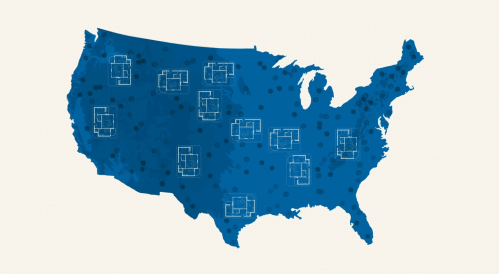Congress has given the Bush White House yet another chance to operate outside the Constitution. Unsurprisingly, the administration has taken it. Treasury Secretary Henry Paulson now has the go-ahead for his two-part plan to salvage Fannie Mae and Freddie Mac, the government-sponsored mortgage companies — a blueprint that violates fundamental American principles in two worrisome ways.
First, the Treasury will be allowed to advance money to Fannie and Freddie (and even to buy their stocks) in unlimited quantities to keep them afloat — in any fashion Mr. Paulson sees fit. Yet the Constitution requires that “no money shall be drawn from the Treasury, but in consequence of appropriations made by law.” Even in wartime, budgets for the military specify how much is to be spent for what purposes.
Second, as an alternative to increasing the national debt, Mr. Paulson wants to let the two mortgage lenders become preferred customers of the Fed’s discount window, with the authority to pawn their own securities for cash. But only Congress has the constitutional power to borrow on the credit of the United States. Wright Patman, who headed the House Banking Committee from 1963 to 1975, liked to say that the Constitution gave Congress exclusive power to coin money and regulate its value, and that power was merely “farmed out” to the Federal Reserve.
It isn’t a good idea to authorize the Treasury secretary to spend unlimited amounts of taxpayer money, even accepting the administration’s argument that Mr. Paulson will probably never have to use it. Even worse is the notion that the Fed’s portfolio of assets — assets that back our currency — should be polluted by the inferior stuff of collateralized mortgage obligations.
Fortunately, there might just be a way to bail out Fannie and Freddie without willfully ignoring the Constitution. Should the two mortgage firms need a cash infusion, Mr. Paulson could spare the Treasury and dip into a little-known pool of money called the Exchange Stabilization Fund.
A little history first. One reason the federal government is under an obligation to guarantee full payment of the debt instruments issued by Fannie Mae and Freddie Mac stems from a decision made at the Federal Reserve Bank of New York about a dozen years ago.
Historically, foreign central banks that found themselves with excess dollars as the result of the American trade deficit invested that money exclusively in Treasury notes and bills. As a service, the New York Fed made those investments for them, guaranteeing them the best current price and retaining legal custody of the paper as their agent.
However, by the mid-1990s the countries that had large trade surpluses with the United States — primarily in East Asia and the Persian Gulf — began to demand a better return on investment than that offered by Treasury paper. In response, the New York Fed began to buy them “federal agency” paper — including large amounts of obligations from Fannie and Freddie. This paid somewhat better interest, and while it was not officially guaranteed by the government in the way Treasury bills were — well, you know, if push came to shove, Washington could be counted on to do the right thing.
These foreign-government accounts now hold $985 billion worth of Fannie and Freddie paper. It explains why, in mid-July, Secretary Paulson (as well as Senator Chris Dodd, the Connecticut Democrat who heads the Senate Banking Committee) began giving press conferences about how sound the two firms really were, no need to worry. Behind the scenes, Treasury officials overseas made phone calls to the local central banks and finance ministries, stressing that the two mortgage giants would weather the storm.
But the truth is that nobody knows. Fannie and Freddie have financed several hundred billion dollars of doubtful mortgage paper that may or may not pay off enough to meet their debts, and they cannot predict whether they will have gains or losses from their gigantic exposures in the derivatives markets.
If the government had not guaranteed the full payments of principal and interest on their paper, the foreign governments that own so much of it might have had to show losses on their dollar-denominated accounts. To say the least, this would make them reluctant to continue to finance our trade deficit, our wars and the strength (such as it is) of our dollar. Our interest rates, and not just for mortgages, would soar.
So the debate about whether dishonest lenders and dumb borrowers should have been bailed out was really meaningless — the conclusion was foregone. The international position of the dollar had to be defended against even the hint of possible failure at Fannie and Freddie; they had to be saved at all costs.
This brings us to the Exchange Stabilization Fund, which could give the government the means to save Fannie and Freddie without ignoring the Constitution. The fund was started in 1934 as a place to set aside the profits credited to the government when President Franklin Roosevelt took possession of the nation’s monetary gold. It’s been used sparingly ever since, perhaps most notably when Treasury Secretary Robert Rubin used it to extend a $20 billion line of credit to Mexico in 1995.
The net wealth of the fund, most of which can be realized with the stroke of a pen, is about $41 billion. Among the uses specified when it was created was maintaining “orderly exchange arrangements and an orderly system of exchange rates.” Nothing could be more disruptive of orderly exchange arrangements than even the hint of a default at Fannie and Freddie.
Just because Congress has given Mr. Paulson a blank check to dip into the Treasury doesn’t mean he has to do it. Among the advantages of using the stabilization fund is that it comes with built-in Congressional oversight — a mandatory monthly review by Congress was written into the law in 1978. Should conditions worsen at Fannie and Freddie, Congress would have an early warning system.
We should all hope that Fannie Mae and Freddie Mac escape this jam on their own. Should they falter, however, it’s only sensible for the Treasury and Congress to have a plan to step in. But the bailout bill that President Bush is expected to sign this week will give Secretary Paulson untested and unconstitutional powers. Why take that leap when there are proved alternatives like the Exchange Stabilization Fund?



Commentary
Op-edMortgaged to the World
July 29, 2008